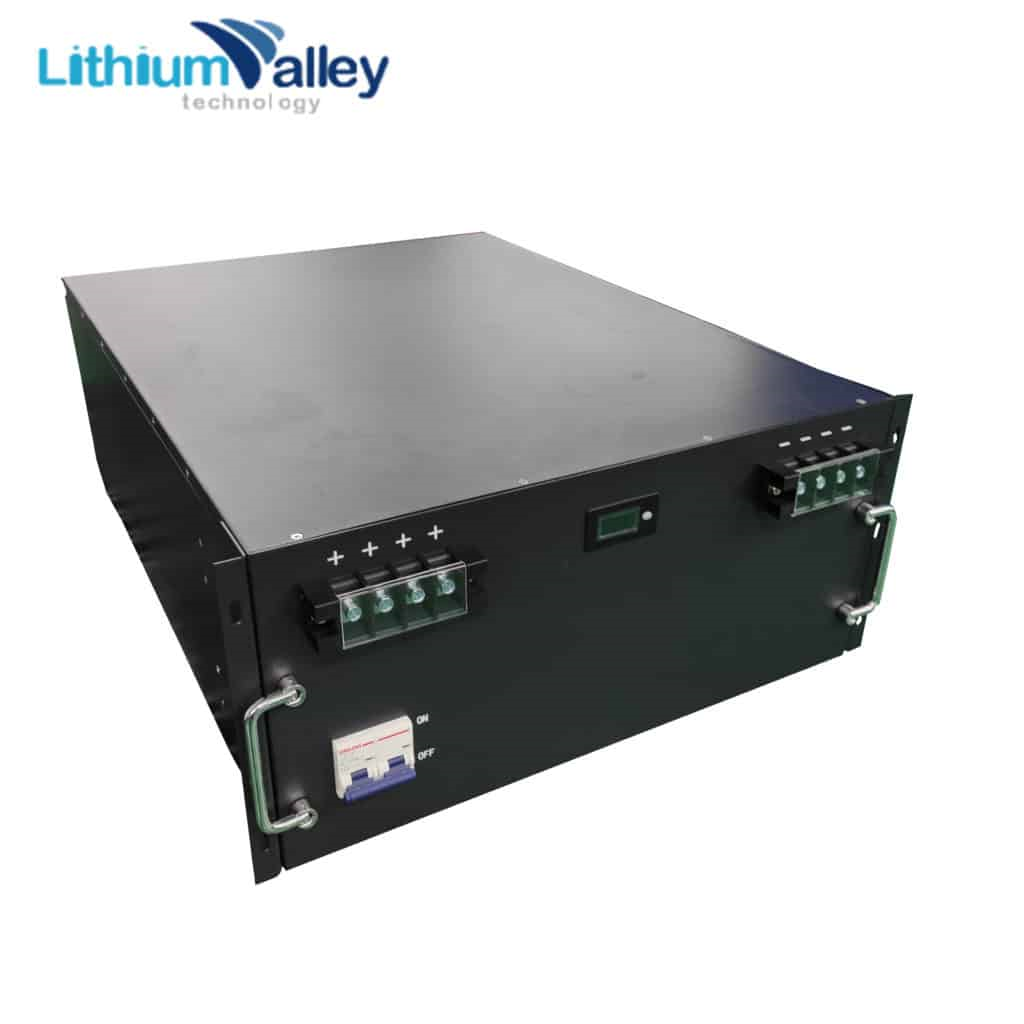Most Popular battery models for UPS
| Model | Current | Photocol | Case |
| 48V50AH | 1C | RS485,Canbus | Metal case |
| 48V100AH | 1C | RS485,Canbus | Metal case |
| 48V200AH | 1C | RS485,Canbus | Metal case |
| 48V300AH | 1C | RS485,Canbus | Metal case |
| 48V400AH | 1C | RS485,Canbus | Metal case |
Lithium batteries have been commercialized in various applications for more than 20 years. So why are they not widely used in data center UPS? the answer is like all other applications, lithium batteries can not provide UPS suppliers with a reasonable balance between price, energy density, power, safety and reliability in UPS application. But in the past 10 years, improvements in lithium-ion chemistry and technology have provided UPS suppliers with viable solutions. These improvements are largely due to the development of the electric vehicle industry.

The price advantage of lithium iron phosphate batteries will gradually become prominent, and energy storage will be an important potential market for lithium iron phosphate in the future. It is reported that compared with the NCM, lithium iron phosphate has obvious advantages in terms of service life, safety, and fast charging and discharging, and is more suitable for the energy storage market. In the UPS uninterruptible power supply system, the backup battery pack is the last line from the power outage for the entire power supply system, and it is also the focus and difficulty of power supply maintenance. In the system interruption accident, the fault caused by the battery pack accounts for a larger proportion, therefore, people will be more cautious about the battery changes in backup battery technology.
- Low energy density, but with high weight and a big size.
- The charging and discharging efficiency is low, the charging and discharging efficiency is about 92%, and the charging and discharging efficiency will even decrease after a period of use.
- The valve-regulated lead-acid battery has a short life span, with a design life span of 5-8 years, and most practical use is 3 to 5 years.
- The operating environment is limited. When the temperature exceeds 25 degrees, the battery life will be reduced by half when the ambient temperature increases by 7 to 10 degrees.
- The storage battery uses a large amount of lead, which is likely to cause serious pollution to the environment during mining, processing and use.

Current in the mature energy storage applications, lithium iron phosphate battery distributed energy storage power system have long been widely used in communication base stations, user-side peak shaving and valley filling, off-grid power stations, microgrids, rail transit, UPS and even household energy storage. It is estimated that by 2020, the cumulative installed capacity of China’s energy storage market will exceed 50GW, which is expected to bring a significant increase in the demand for lithium iron phosphate batteries.
5G is facing a unfavorable development factor, the power consumption of 5G base stations need a several times of power than the 4G base stations, that’s means great demands expansion on the power system at the same time. Currently, lithium batteries are mainly used in 4G small base stations, large energy storage base stations are still dominated by lead-acid batteries. As the power of 5G equipment is greater than 4G, this correspondingly means that almost all of the Network operator company’ current Data center rooms must modify the power supply system to ensure power supply, including switching power supplies, batteries, and power cords replacement.
Due to pollution and performance, lead-acid batteries are gradually unable to meet the requirements of communication base stations and will be gradually eliminated. But new problems have initially appeared during choosing alternative energy sources. In the fierce competition and technological development, Network operator company are constantly pursuing low costs. Purchasing low-cost lithium batteries is the most direct and effective way to reduce costs.
After upgrading to 5G, the performance of the lithium iron phosphate battery in the base station system will greatly affect the stability of the network signal, which is related to the user’s usage and experience, so Network operator company will have higher requirements for battery consistency and stability. In view of the characteristics of lithium iron phosphate batteries, when the UPS power supply system is set up, it is only need to adjust the charging voltage of the UPS to meet the the LiFePO4 battery pack. Because even the lithium battery is in a charging state for a long time, the battery characteristics is not easy to change due to its own BMS balance protection function.

- 3C batteries (1)
- 48C Advanced Energy Project Credits (1)
- ActiveBalancing (1)
- Advanced Storage Solutions (1)
- advanced technologies (1)
- African market (1)
- AI Algorithms (1)
- AI in Energy Storage (1)
- air conditioning (1)
- All-in-One Energy Storage (1)
- American electricity market (1)
- ancillary services market (1)
- application scenarios (2)
- Arnstadt (1)
- automotive industry (1)
- backup generators (1)
- Backup power (1)
- batteries (2)
- Battery Discharge (1)
- Battery Energy Storage (1)
- Battery Energy Storage Systems (1)
- Battery Energy Storage Systems (BESS) (1)
- battery factory (1)
- battery industry event (1)
- battery management system (3)
- battery management systems (1)
- battery market (1)
- battery materials (1)
- battery pack (1)
- Battery Storage Safety (1)
- Battery technologies (1)
- battery technology advancements (1)
- battery type (1)
- BatteryLongevity (1)
- BatteryManagementSystem (1)
- BatterySafety (1)
- BatteryTechnology (1)
- BESS (1)
- Birmingham Exhibition (1)
- BMSArchitecture (1)
- Brazil energy storage (1)
- Burkina Faso (1)
- Capacity (1)
- capacity rule (1)
- carbon management (1)
- carbon neutrality goals (1)
- CATL (1)
- CE marking (1)
- certification (1)
- certifications (1)
- Charge Current (1)
- Charge/Discharge Rate (1)
- Chemical Storage (1)
- China electricity market (1)
- China International Battery Fair (1)
- CIBF 2023 (1)
- Clean energy (6)
- clean energy incentives (1)
- Clean Energy Revolution (1)
- clean energy solutions (1)
- Climate Goals (1)
- Climate Legislation (1)
- Commercial (1)
- Commercial Energy Storage (2)
- CompleteCurrentControl (1)
- Compressed Air Energy Storage (CAES) (1)
- consumer batteries (1)
- Containerized Energy Storage (1)
- Continuous Discharge Duration (1)
- conversion efficiency (1)
- Cooperation (1)
- cost composition (1)
- cost parity (1)
- cost reduction (1)
- Cost-effective storage (1)
- critical power (2)
- CSA certification (1)
- Customized Energy Storage (1)
- DC bus voltage (1)
- Decarbonization (1)
- Decarbonized future (1)
- Demand Forecasting (1)
- Department of Energy (1)
- DesignConsiderations (1)
- development strategies (1)
- Direct Pay (1)
- Discharge Current (1)
- discharge curve (1)
- Distributed Energy (1)
- Dongguan Lithium Valley (2)
- dual carbon goal (1)
- Dubai World Trade Center (1)
- efficient energy storage (1)
- Electric Vehicle Charging (1)
- Electric Vehicles (2)
- Electricity Costs (1)
- Electricity Infrastructure Operations Center (1)
- electricity market (1)
- electricity price mechanism (1)
- electricity prices (1)
- electricity supply (1)
- electrochemical energy storage (1)
- Electrochemical Storage (1)
- Energy Certification (1)
- Energy Community Adder (2)
- energy companies (1)
- energy consumption (1)
- energy consumption management (1)
- energy crisis (1)
- Energy Demand (1)
- Energy Demands (1)
- energy density (2)
- energy distribution (1)
- Energy Efficiency (1)
- energy industry (1)
- Energy Industry Solutions (1)
- energy investment (1)
- Energy Landscape (1)
- Energy Management System (3)
- energy management systems (1)
- energy professionals (1)
- energy sector (1)
- energy solutions (2)
- Energy storage (16)
- Energy Storage Batteries (3)
- Energy storage battery business (1)
- Energy Storage Battery Industry (1)
- Energy Storage Battery Technology (1)
- energy storage business model (1)
- Energy Storage Cabinets (1)
- energy storage capacity (1)
- Energy Storage Certification (1)
- Energy Storage Challenges (1)
- energy storage components (1)
- energy storage converters (1)
- energy storage equipment (1)
- Energy Storage Incident (1)
- energy storage industry (4)
- energy storage market (1)
- Energy Storage Products (1)
- energy storage profitability (1)
- energy storage projects (1)
- Energy storage research (1)
- Energy Storage Solution (2)
- Energy Storage Solutions (4)
- Energy Storage System (3)
- energy storage system solutions (1)
- Energy Storage Systems (5)
- Energy Storage Technologies (2)
- Energy Supplies (1)
- Energy Supply Challenges (1)
- Energy Transition (1)
- energy trends (1)
- EnergyEfficiency (1)
- EnergyStorage (1)
- Environmental Innovation (1)
- environmental sustainability (1)
- ESS chain (1)
- EU countries (1)
- European battery factory (1)
- European electricity market (1)
- European Market (1)
- European Solar Market (1)
- Exhibitors (1)
- Extended Tax Credits (1)
- field study (1)
- financing options (1)
- fire protection systems (1)
- Flexibility (2)
- Flow batteries (2)
- Flywheel Energy Storage (1)
- Fossil Fuel Emissions (1)
- fossil fuels (1)
- generation side (1)
- Germany (2)
- Gigawatts (1)
- Global Carbon Emissions (1)
- global energy storage (1)
- global market share (1)
- global power batteries (1)
- government officials (1)
- Government Support (1)
- granular silicon (1)
- Green Energy Initiatives (1)
- Green Living (1)
- Green Technology (2)
- Greenhouse Gas Emission Verification (1)
- grid (1)
- Grid reliability (2)
- grid resilience (1)
- grid side (1)
- Grid Stability (3)
- Grid Storage Launchpad (1)
- grid voltage (1)
- grid-connected (1)
- Guide (1)
- high-voltage battery (1)
- higher discharge rate (1)
- Home Energy Storage (3)
- Home Energy Storage Benefits (1)
- household energy storage (2)
- hydropower (1)
- I&C energy storage (1)
- IEC 62619 (2)
- IEEE 1547 (1)
- inductive loads (1)
- Industrial (1)
- industrial and commercial energy storage (1)
- industrial and commercial track (1)
- Industrial Energy Storage (6)
- Industry Trends (1)
- IndustryStandards (1)
- Inflation Reduction Act (1)
- Inflation Reduction Act (IRA) (1)
- installed energy storage (1)
- integrated energy storage cabinet (1)
- integration (1)
- intelligent solutions (1)
- Intermittency (1)
- International Energy Agency (1)
- International Energy Agency (IEA) (1)
- International Energy Storage Exhibition (1)
- Intersolar (1)
- Intersolar Europe 2023 (1)
- Intersolar Middle East (1)
- Intertek (1)
- inverter (2)
- inverter power (1)
- Investment (1)
- Investment Tax Credits (1)
- ISO 14001 (1)
- ISO 9001 (1)
- ITC (1)
- Johannesburg (1)
- large size silicon (1)
- large-scale energy storage (1)
- Leveraging Solar Power (1)
- life cycles (1)
- LiFePO4 batteries (1)
- lithium batteries (1)
- lithium iron phosphate batteries (2)
- Lithium Prices (1)
- Lithium Valley (14)
- Lithium Valley Products (1)
- Lithium Valley Technology (1)
- Lithium-ion alternatives (1)
- Lithium-Ion Batteries (3)
- lithium-ion battery cells (1)
- lithium-ion voltage (1)
- load capacity (1)
- Long Beach California (1)
- Long Duration Energy Storage (1)
- Long-duration storage (2)
- Low-carbon Future (1)
- low-voltage battery (1)
- LS Energy Solutions (1)
- M&A project (1)
- manufacturing equipment (1)
- Market Opportunities (1)
- market-oriented (1)
- Mechanical Storage (1)
- MEE (1)
- merger agreement (1)
- Microgrids and Distributed Energy (1)
- Middle East Energy Summit (1)
- Mobile Energy Storage (1)
- Multiple-MPPT (1)
- Na+ battery (1)
- Net Zero Emissions (2)
- Netherlands (1)
- new energy battery technology (1)
- Next-generation batteries (1)
- North America (1)
- NREL (1)
- off-grid (1)
- oil and gas (1)
- operating efficiency (1)
- optical storage (1)
- Pacific Northwest National Laboratory (1)
- PassiveBalancing (1)
- Peak Times (1)
- peak-valley price difference (1)
- Photovoltaic (PV) Solar Power (1)
- photovoltaic components (1)
- photovoltaic installations (1)
- plug-and-play (1)
- policy certainty (1)
- polysilicon (1)
- power batteries (1)
- power battery company (1)
- power battery developments (1)
- power conversion system (1)
- power density (1)
- Power Generation (2)
- power match (1)
- power supply (1)
- power system (1)
- power systems (1)
- power transmission (1)
- Power/Energy (1)
- Predictive Analytics (1)
- Product Carbon Footprint Certificate (1)
- product line (1)
- product upgrades (1)
- production capacity (2)
- production process (1)
- profit model (1)
- Pumped Hydro Storage (1)
- quality management system (1)
- R&D team (1)
- raw materials (1)
- regional energy transformation (1)
- Reliability testing (1)
- Reliable Power Supply (1)
- renewable energy (18)
- renewable energy capacity (1)
- Renewable Energy Industry (1)
- Renewable energy integration (2)
- renewable energy investment (1)
- renewable energy policies (1)
- renewable energy production (1)
- Renewable Energy Revolution (1)
- Renewable Energy Solutions (1)
- renewable energy sources (1)
- Renewable Energy Storage (1)
- RenewableEnergy (1)
- renewables sector (1)
- Residential & Commercial Energy Storage (1)
- residential energy storage (2)
- rural energy storage (1)
- safer energy storage (1)
- Sandton Convention Centre (1)
- Scalability (1)
- service life (1)
- shadow scan function (1)
- signing ceremony (1)
- silicon materials (1)
- silicon wafers (1)
- single-cluster battery management (1)
- Single-MPPT (1)
- smarter energy storage (1)
- SNEC Exhibition (1)
- Sodium-ion batteries (1)
- Sodium-ion Battery (1)
- Solar & Storage Live 2023 (1)
- Solar Capacity (1)
- solar cells (1)
- Solar Energy (2)
- Solar Energy Industry (2)
- solar energy products (1)
- solar energy storage (1)
- Solar Energy Technologies (1)
- Solar Generation (1)
- Solar Installations (1)
- solar integration (1)
- solar modules (1)
- solar panel energy storage (1)
- solar power (2)
- Solar PV (1)
- Solar Show Africa 2023 (1)
- Solar Sustainability (1)
- solar trends (1)
- Solar-Plus-Storage Integration (1)
- Solid-State Batteries (1)
- South African Minister of Energy (1)
- Stacked High-Voltage Battery (1)
- standardization (1)
- StateEstimation (1)
- Storage Installations (1)
- Storage Ratio (1)
- Storage Systems (1)
- Strategy Director (1)
- SUMEC (1)
- Supplier Conference (1)
- supply chain cost (1)
- Supply Chain Traceability (1)
- surge power (1)
- Surplus Energy (1)
- Sustainability (1)
- Sustainable Development (1)
- Sustainable Energy (2)
- Sustainable Future (1)
- Sustainable Power Grid (1)
- sustainable power solutions (1)
- Sustainable Practices (1)
- Sustainable Technology (1)
- SustainableEnergy (1)
- system structure (1)
- TD (1)
- technical components (1)
- Technological Innovation (2)
- technology exchange (1)
- Temporary Power Solutions (1)
- ternary lithium batteries (1)
- Thermal Storage (1)
- Thuringia (1)
- Transferability (1)
- transparent reporting (1)
- TUV certification (1)
- Types of Energy Storage Systems (1)
- UK (1)
- UK Legislation (1)
- UL 1973 (2)
- UL 9540A (1)
- US Federal Government (1)
- US manufacturers (1)
- US public investments (1)
- user side (1)
- Utilities (1)
- voltage match (1)
- wholesale market (1)
- Wind Capacity (1)
- Wind Energy (1)
- Wind Generation (1)
- Wind Installations (1)
- wind power (1)
- winter energy demand (1)
- Zero Emissions (1)
- Zonsen Power (1)
- ZZonsen Power (1)

